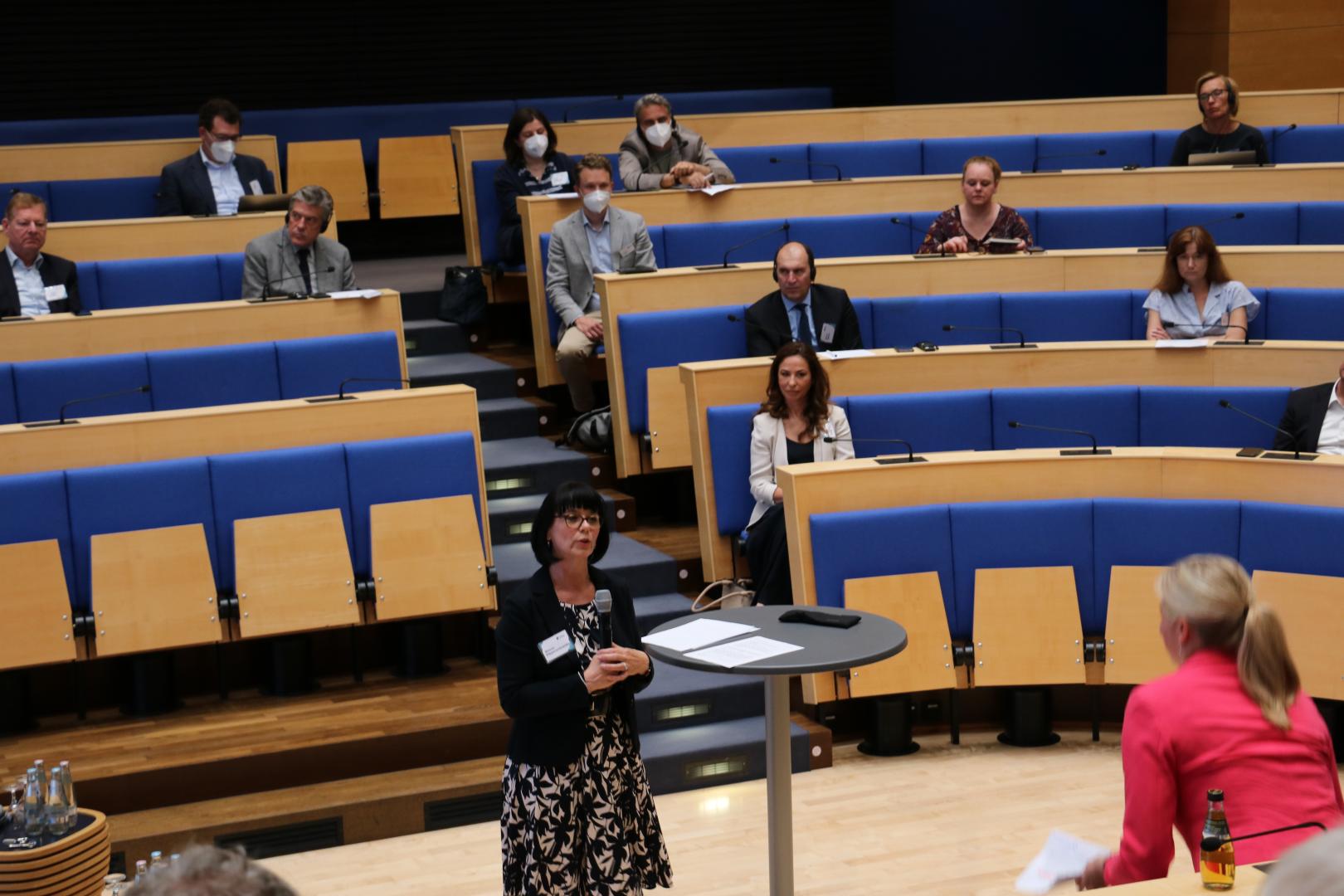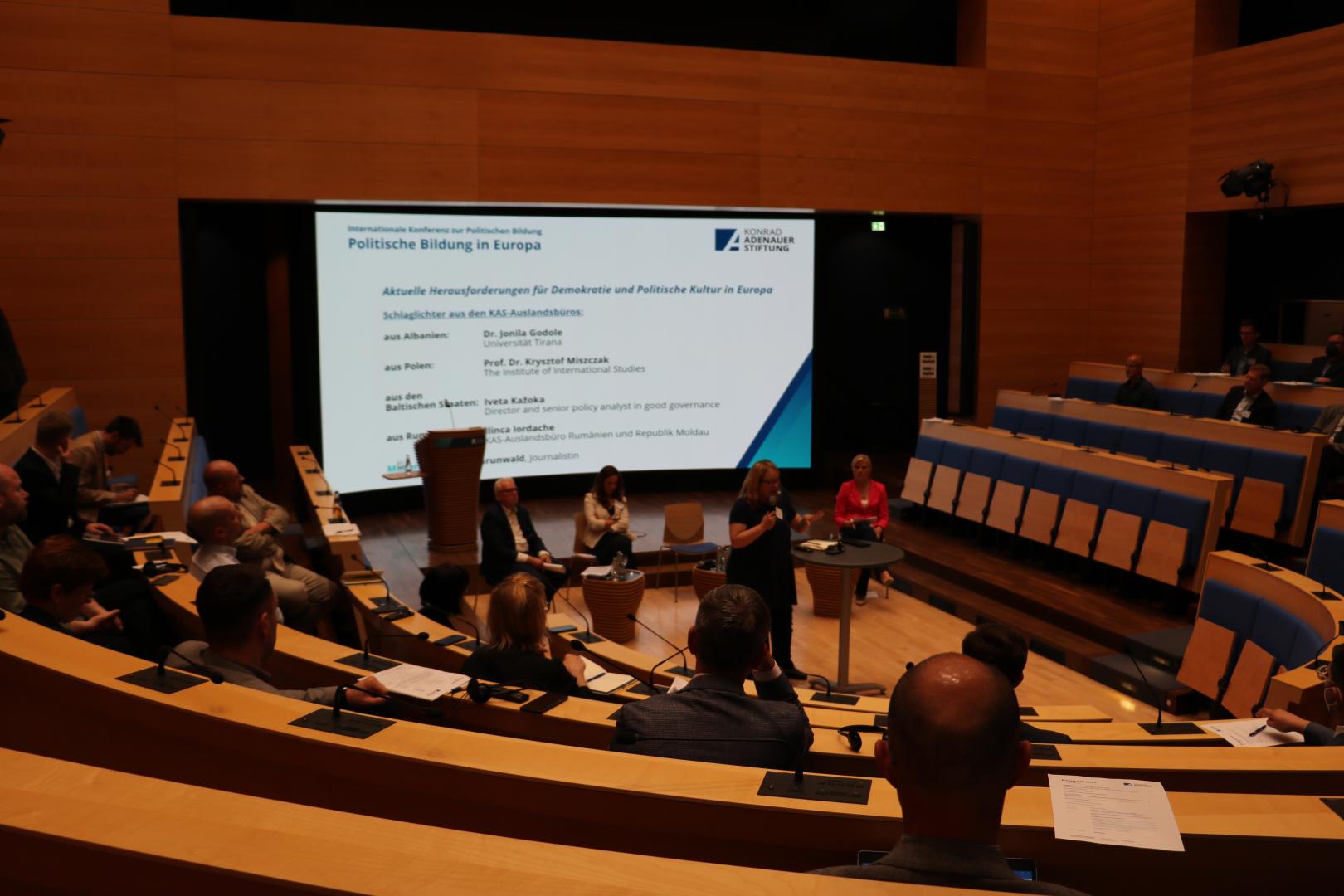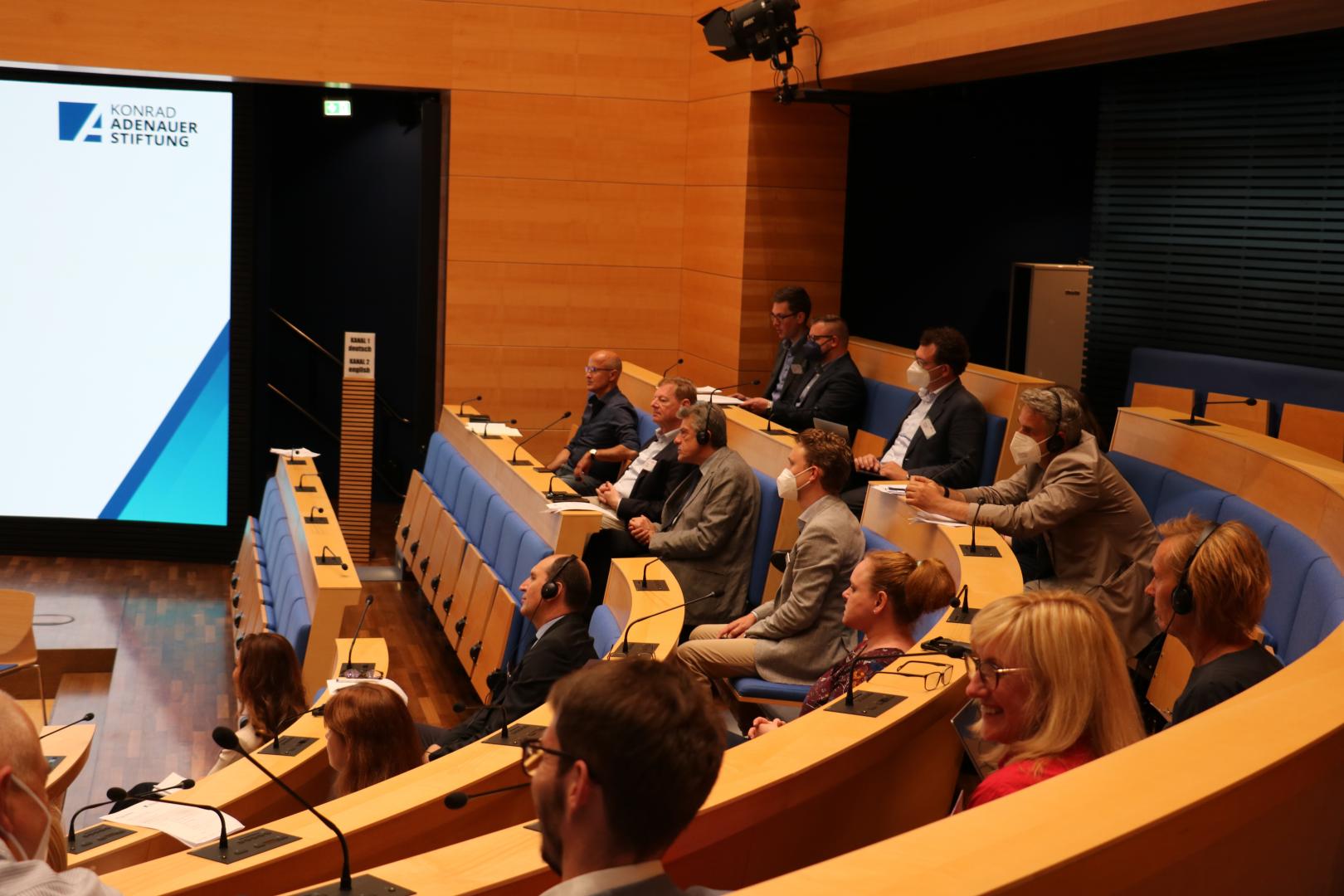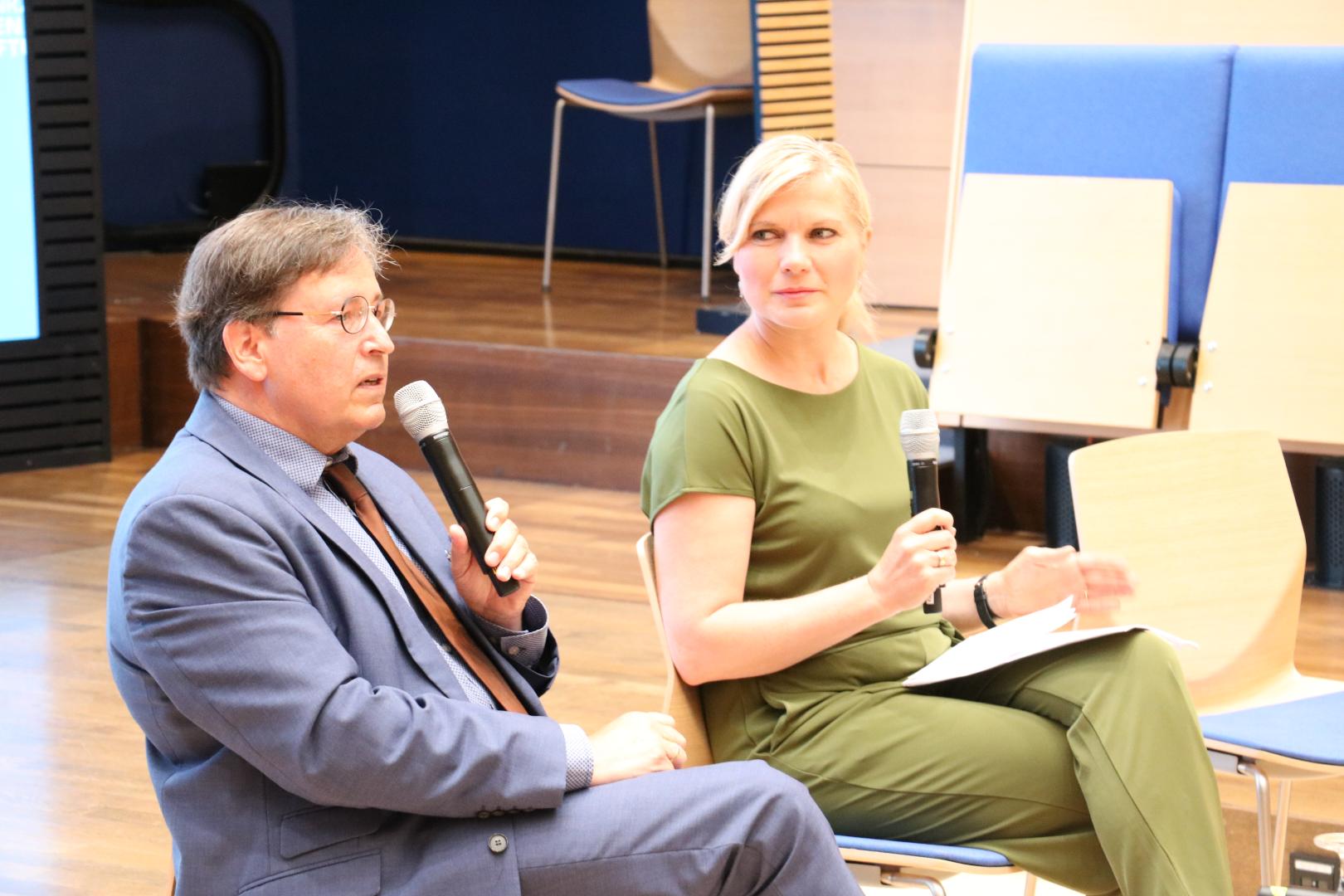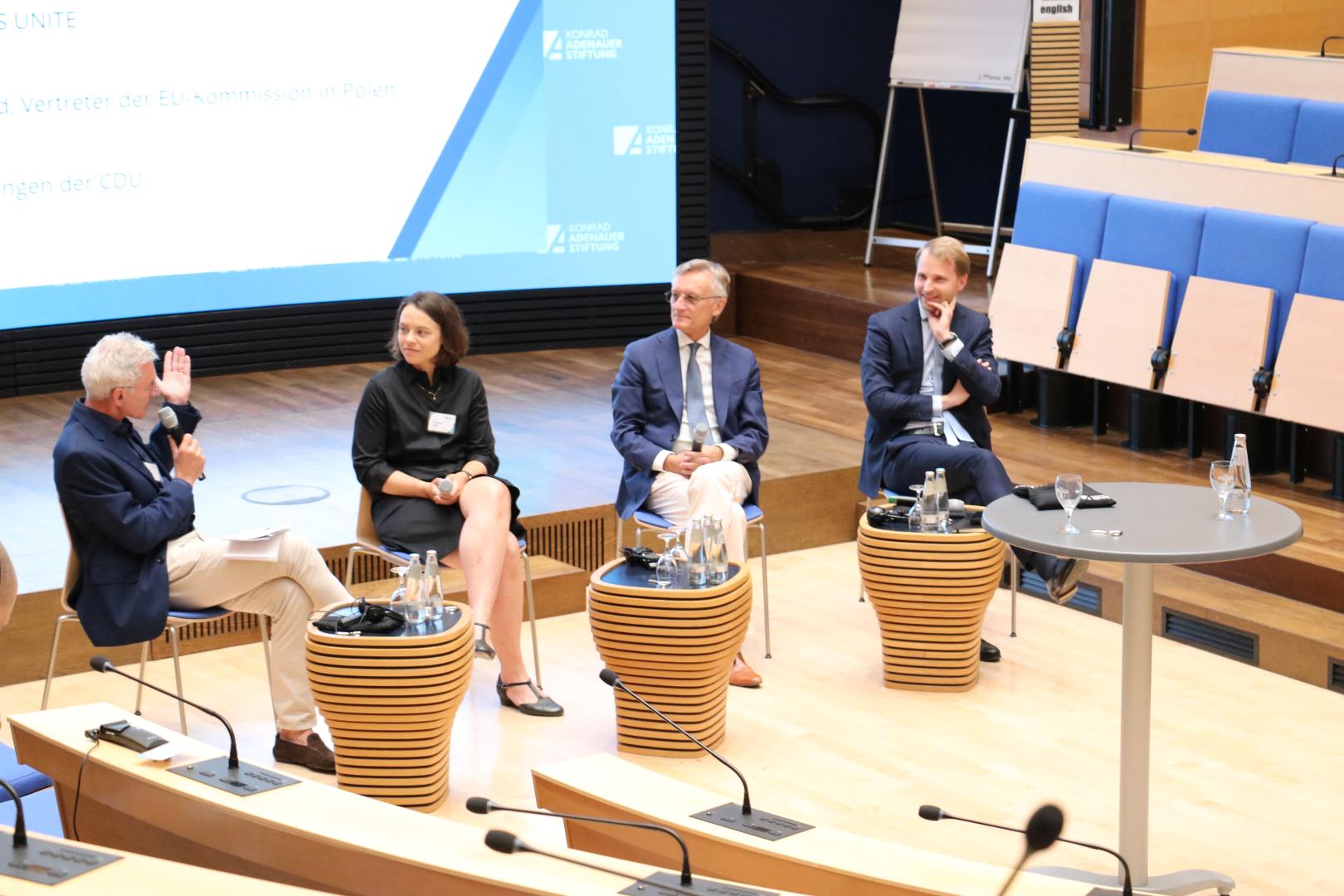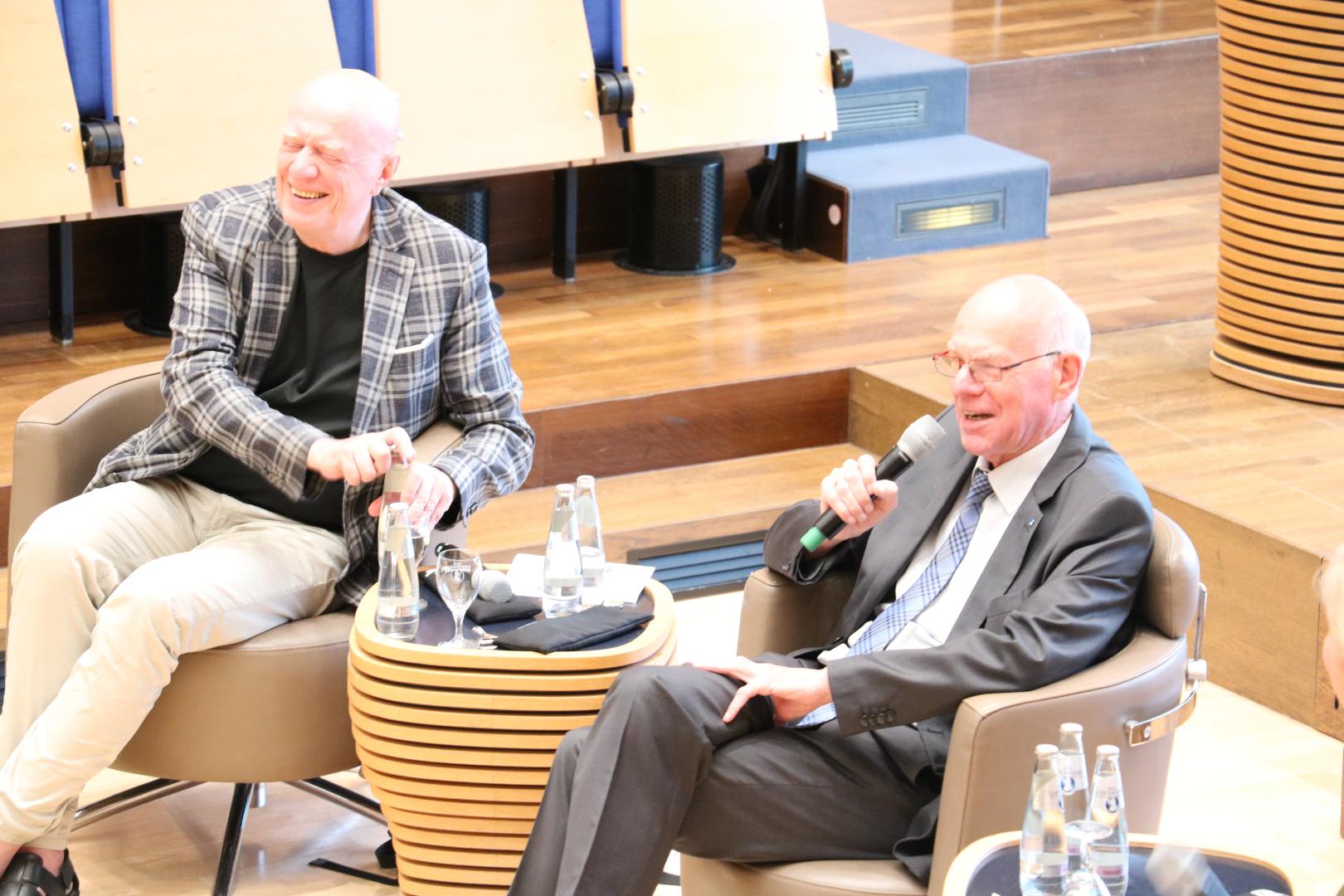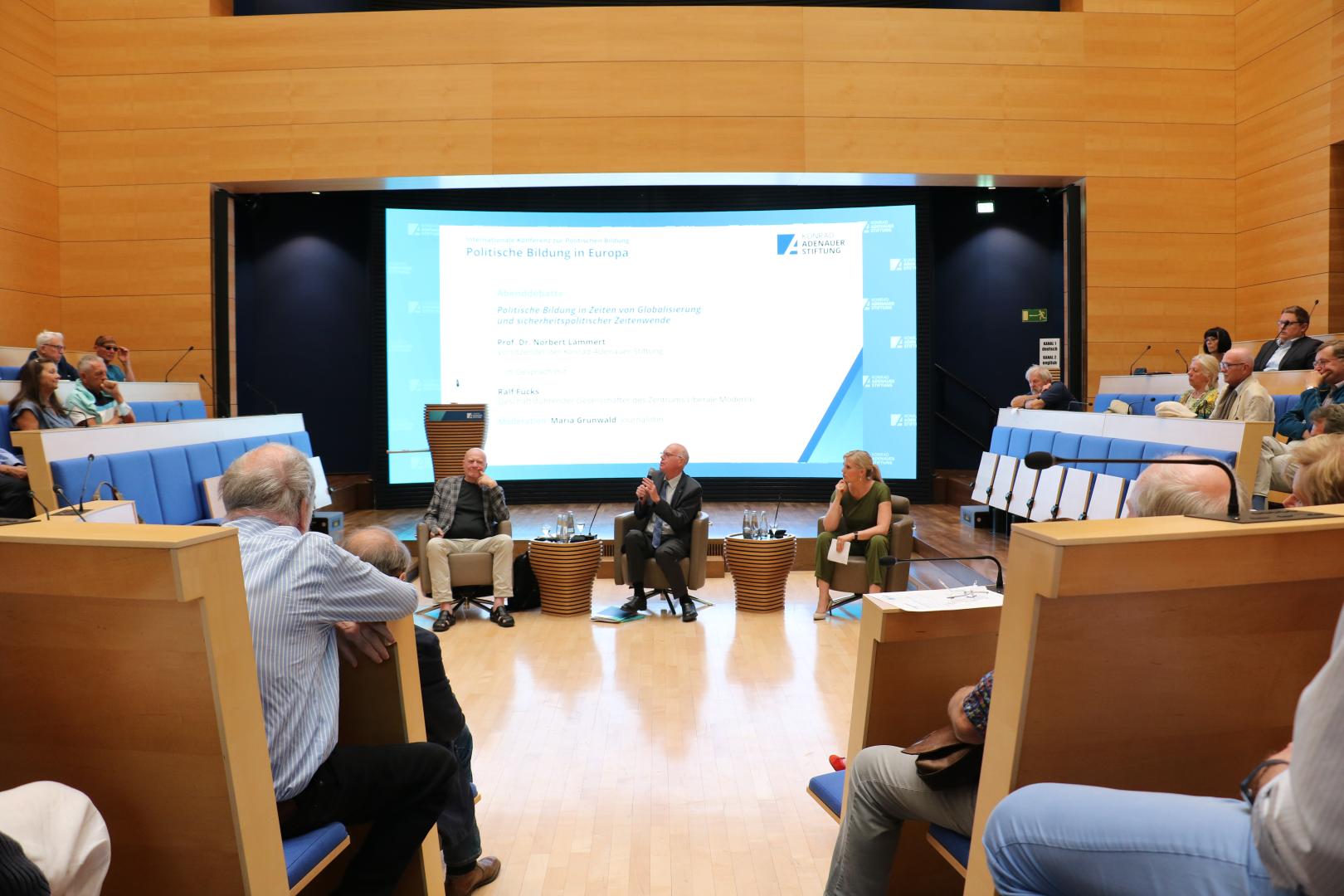A premiere for the KAS Civic Education - the 1st International Conference on Civic Education (ICCB) brought together for the first-time people from other European countries and Germany who are committed to civic education, both professionally and privately. This resulted in an intensive exchange about topics and challenges that move everyone together. The threat to security posed by the Russian war of aggression on Ukraine ran like a thread through the conference, but the consequences of globalization and digitization, the division and fragmentation of societies, the changing cultures of debate and the loss of trust many citizens have in politicians and democratic institutions were also topics of discussion.
In her opening address, Dr. Melanie Piepenschneider, Head of the Department of Civic Education KAS, placed the conference in the context of the dramatically changed new international situation and outlined the resulting consequences for civic education work. Furthermore, she connected four central goals with the ICCB: the closer networking of domestic and international work, getting to know each other and learning from each other, the discourse about the common project Europe and the development of a network between the participants.
Following, current challenges for politics and political culture in Europe were discussed. Experts from eight European countries, moderated by the journalist and former KAS scholarship recipient Maria Grunwald, presented highlights from their home countries:
Dr. Jonila Godole from the Institute for Democracy, Media & Culture in Tirana gave the audience a deeper impression of Albania. The lack of a historical reappraisal of 45 years of communism has still fatal consequences for today's society and political culture in her country. Responsibility has hardly any value in political life and the conviction prevails that one can get away with a lot if one has the power to do so. In order to understand the history of Albania and the current situation of the country, civic education is urgently needed.
In his keynote speech from Poland, Prof. Dr. Krzystof Miszczak, Head of the International Security Unit at the Warsaw School of Economics, spoke vehemently in favor of a strong and combative Europe. Against the backdrop of the international system competition that has been sparked off, democracy in Europe and thus also the EU must not call itself into question. Democracy must also show strength and be defended, and civic education must play its crucial part in this.
Some further examples of highlights of civic education in Europe:
Iveta Kažoka, political analyst from Latvia, spoke about the increasing polarization of society and illustrated the political culture in Latvia with practical examples. She also pointed out that the government is primarily guided by the wishes of the majority population, which raises questions about how to deal with the (mainly Russian speaking) minority.
Illinca Iordache, a longtime project coordinator for civic education at the KAS office in Romania and the Republic of Moldova, presented the discrepancy between urban and rural areas regarding civic education, focused on the cooperation between NGOs and state agencies and presented interesting examples for the practical use of civic education.
Prof. Dr. Lars Trägårdh, author, historian and a professor at Ersta Sköndal University College Stockholm, focused on the history of civic education in Sweden and drew a image of a crisis situation for today's civic education. He cited the financial dependence of NGOs and foundations on government grants as one reason for this danger, which damages the discourse on education policy. Instead, he pleaded for resource pluralism to strengthen the independence of civic education work, so that political educators could once again stand on their own feet.
Prof. Dr. Andrea De Petris, Director at the Centro Politiche Europee in Rome, described the lack of legal regulations for funding political parties as the primordial problem of civic education in Italy and outlined an extremely differentiated political education landscape in his country. He also described several characteristics which included a lack of transparency in the structures and financing of political education, the absence of party-affiliated foundations and the often unclear purposes of political foundation organizations, which usually resembled personal networks rather than systematic civic education.
Marko Prusina, research associate at KAS Zagreb, started his presentation from Croatia with freedom of opinion and debate and the teaching of media literacy, outlined the model of the "School for Life" and focused on the target group "young adults" and their protection against "fake news". As a practical example of civic education work, he presented the Political Academy of KAS Zagreb with a Croatian partner organization.
Benjamin Kurc, head of the German-French Civic Fund, gave a critical report on the situation of civic education in France due to the fact, that it is hardly or not at all existent. Instead, there is a so-called "Volkskunde" in school education, which, however, does not provide any practically useful content. Kurc described the historical reasons for this and advocated for a stronger dialogue with other countries and especially Germany in order to develop a common, European political culture and education.
Finally, Winfried Weck, head of the ADELA regional office and the Panama foreign office, as well as acting director of the Costa Rica foreign office, gave an excursus on the situation of civic education in Latin America and the ADELA regional program. Thus, he explained the three main objectives of the program (security, economy and the fulfillment of the 2030 Agenda) and formulated seven theses on the characteristics of civic education in Latin America.
In summary, the highlights of civic education in Europe gave the following impression:
Civic education and political culture in Europe are characterized by enormous heterogeneity. They each have different historical preconditions and often specific current challenges. As a result, the topics and methods that can be used successfully also differ a lot.
The second day of the conference started with a reflection on the question "What kind of education do (political) people need? - In his opening statement, Thomas Kerstan, education policy correspondent for DIE ZEIT and publisher of ZEIT Campus, approached an answer to this question. He criticized the lack of a substantive debate on education in Germany, which is urgently needed because the world is currently reorganizing itself and Germany with it. The consequences of globalization, migration, the threat of nuclear war, the digital transformation and the individualization of media consumption are changing and fragmenting societies. This emphasis the importance of the cohesion of society to agree on an educational canon in which knowledge itself also enjoys central importance. In his contribution, Thomas Kerstan presented a concrete proposal "100 works as Kerstan's canon", which he did not want to be understood as a dogma, but rather as a playful debate which should be flexible and adaptable with a view to the world.
In the following debate and working groups, participants raised questions such as:
How can common values be communicated and be presented?
(How) can it be ensured that an educated person also acts “good”?
How can education, character building and civic education be intertwined?
How can the situation of many young people who cannot read, write and calculate properly at the age of 14 to 16 be improved?
What practical possibilities exist to counteract targeted disinformation?
What concrete measures can be taken to promote personal development and political commitment among young people?
What good examples are there for the promotion and further training of political personnel?
The "Common Project Europe as a Future Task of Civic Education Work" was on the agenda in the afternoon of the second day of the conference, which was introduced with a video message by Dr. Hans-Gert Pöttering. The former president of the European Parliament and former chairman of the KAS put "in a nutshell what we have in Europe" and, in view of current threats, focused on the revitalization of the community of peace and values. In addition, Pöttering called for a community of action against climate change, the strengthening of the Common European Security and Defense Policy and, with a view to young people, advocated more educational work on European politics.
How "political education can strengthen the European project" was the topic of the next panel discussion that followed:
Susanne Zels, founder and managing director of VALUES UNITE,
Marek Prawda, former ambassador of Poland in Germany and representative of the EU Commission in Poland,
Ruben Schuster, Head of the Office for Foreign Relations for the CDU.
The panel, moderated by journalist Stefan Robiné, noted at the end of their discussion that "sensible political education can open eyes" if it shows, hat Europe is "unity in diversity" of traditions and identities;
That Europe must become "more Eastern" by focusing more on the diversity and special concerns of Eastern Europe against the backdrop of the Russian war;
That Europe must change and reform itself in order to be immune to the rise of totalitarian systems.
Following the panel discussion, Stefan Robiné put together four rotating ad hoc working groups so that all participants could discuss the following questions with each other and make recommendations:
How will the Russian war on Ukraine change political education (at KAS)?
Which topics and formats are moving into the focus of civic education work as a result of the war?
What should a joint organization/platform for political education do?
If you have one wish: what would you like to see in order to make European civic education even better?
There were so many answers to these questions that they cannot be documented here, but closely evaluated they will provide a wealth of suggestions and recommendations for practical work, which will soon be available to all interested parties.
At the end of the second day of the ICCE, the highlight of this occasion took place - the conversation between former Bundestag President and Chairman of the KAS, Prof. Dr. Norbert Lammert, and Ralf Fücks, Managing Partner of the Center for Liberal Modernity and former Chairman of the Heinrich Böll Foundation.
"Political Education in Times of Globalization and Security Policy Turning Point" was the topic of the discussion, again moderated by Maria Grunwald. As it was also seen before, the Russian-Ukraine war was the dominant topic, introduced by Ralf Fücks, who gave an impressive summary of his last visits to the Ukraine, which took place only a short time ago. Many people are currently concerned about their lives and their very existence; he stated, that it is a race against the time before Ukraine bleeds to death.
In the further course of the discussion, the term "turning point in history" (in German “Zeitenwende”) was questioned, which is often used in the media to characterize the current situation. Behavior is changed more by events than by developments, said Norbert Lammert, and the term "turning point" is more a question of perception. For a long time, he said, realities had been suppressed, and the brutality of Russian policy had already become obvious in 2008 regarding Georgia and the annexation of Crimea in 2014. According to Ralf Fücks, Russia's behavior has resulted in a war of international annihilation against Ukraine, and the resulting questions have not yet been properly discussed in Germany. Civic education must counter this and he explained the world with historical facts of experience: "as it is and not as one would like it to be." He also appeals towards the civic education to make people aware of the seriousness of the situation, to give them orientation in the confusion of information and disinformation, and to remain capable of criticism. Norbert Lammert stated the need for action in view of the German government's turnaround in security policy. He said that Chancellor Scholz's turning point speech was a historic course correction, but that the attempt to implement and enforce it should be expanded.
At the end, the two panelists addressed the scope and impact of civic education in a changed public sphere. In a changed media world, only a variety of formats can dissolve the bubbles within which only the confirmation of one's own opinions and attitudes counts.
On the morning of the third day of the conference, the participants reviewed their impressions of the ICCE and, moderated by Dr. Christian Schmitz, International Topics in Civic Education, made recommendations and expressed wishes for the future. The opportunity for such an exchange is unique so far and it should be made sustainable and should be continued. It is precisely the diversity of political education and political culture that makes the dialogue valuable and helpful for one's own work. The need to network and exchange practical experiences was shared by all. Some participants from non-EU countries had a critical view towards official EU policy. With reference to the Western Balkans, for example, they said that the fear of many people there that they would be "pushed under the wheels" in the current crisis by the Russian attack on Ukraine and that they would not receive enough attention in the face of actual and perceived threats and are not taken seriously with their concerns.
Finally, a practical proposal for future networking, communication and documentation in civic education was made at the end of the conference: The LinkedIn based "Network Civic Education KAS" was generally applauded. The project, presented by Christian Schmitz as a "step by step project", is to gain momentum as soon as possible.
In addition, the content of this platform is to be supported by a "memorandum of common understanding", which, based on the briefly presented "Beutelsbach Consensus", sets out the goals, tasks and value basis of joint future cooperation in a few points.
The participants of the first International Conference on Civic Education finally parted knowing that they had found a new form of profitable cooperation and with a good feeling that they will be able to continue it in the future.
We would like to thank all those who were involved in the successful realization of the 1st International Conference on Civic Education in Germany and abroad!
Topics
About this series
The Konrad-Adenauer-Stiftung, its educational institutions, centres and foreign offices, offer several thousand events on various subjects each year. We provide up to date and exclusive reports on selected conferences, events and symposia at www.kas.de. In addition to a summary of the contents, you can also find additional material such as pictures, speeches, videos or audio clips.
High-Impact Tutoring: an effective lever for improving basic skills
Why an independent Digital Ministry is indispensable and how it could be structured
Iris Wolff ist Literaturpreisträgerin der Konrad-Adenauer-Stiftung 2025
‘The ME in democracy always needs a WE as well’
The new role of leaders in data-driven school development



